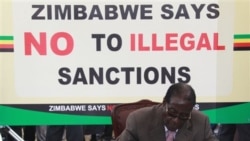Zimbabwe is one of nine countries in sub-Saharan Africa, currently under targeted United States sanctions, and a hearing in Washington on Wednesday, sought to explore their effectiveness or necessity.
One of the witnesses at the hearing, advocated for the continuance of targeted sanctions on Zimbabwe.
Right now the United States has targeted individual sanctions in place for nine sub-Sahara African countries – Burundi, Central Africa Republic, Cote D’Ivoire, Democratic Republic of the Congo, Eritrea, Somalia, Sudan, South Sudan and Zimbabwe.
In opening the discussion on U.S. Sanctions Policy in sub-Saharan Africa at the U.S. Congress, Senator Jeff Flake, said he wanted to determine their effectiveness.
“We’ll examine the recent track records of sanctions on Africa, when they’ve proven to be useful tool in achieving our policy objectives and under what circumstances they are falling flat or causing unintended consequences.”
Responding to these questions, four experts on Africa, including Todd Moss, chief operating officer and senior fellow for Global Development, argued that while the sanctions have not effectively met U.S. objectives, including the controversial Zimbabwe Democracy and Economic Recovery Act (ZIDERA) set in place in early 2000 under former U.S. President George Bush, said sanctions should be maintained.
“Before we change course, we must ask whether the removal of U.S. Sanctions will advance U.S. policy goals, or will the removal play into the hands of the regime? In my view, lifting sanctions at this time will merely strengthen Robert Mugabe and the cabal around him by proving a major propaganda victory. The regime will claim it has vanquished its imperialist oppressors and now has formal American endorsement.”
He added that “the lack of Zimbabwe progress to date is not an indicator that sanctions per se have failed. Zimbabwe’s decline continues primarily because of an entrenched, highly abusive regime combined with very unhelpful regional dynamics.”
Honorable Princeton Lyman of the United States Institute of Peace and also Senior Adviser to the president, cautioned against sanctions in all cases saying often it’s harder to lift them than impose them, and that they are best used in combination with other strategies.
“So the question is how do you deal with countries like Sudan and Zimbabwe and others in which fundamental transformation is necessary to … end the conflict but also to end the human rights violations. And I think it has to be a combination of a long term strategy of engagement, perhaps sanctions later, but linked to individual steps, and building the strong democratic capacities within the countries. Because without those, even a change in regime doesn’t produce the peace and democracy you want.”
Another reality that Senator Flake, who recently visited Zimbabwe, wanted to know to establish was the effectiveness of U.S. sanctions outside other partners like the United Nations or the African Union.
“We’ll look at the relationship between sanctions taken solely by the United States, versus those taken in concert with the international community.”
To this, Ambassador Lyman said without the support of key players, in the case of Zimbabwe, of regional countries or the AU, any U.S. effort to push for UN or other sanctions are futile.
“The rule of thumb that we have found is that when the Africans are unified on wanting UN sanctions, we can usually get them through, China and Russia wont say no if the Africans say this is what we want. But when the Africans are divided, China and Russia say no.”
Meantime, in looking ahead on Zimbabwe with the uncertainty of President Mugabe’s longevity in power, Moss says lifting sanctions on some promising members of the Zanu-PF could help pave the way for a stronger Zimbabwe.
Other senators and witnesses the U.S. Sanctions Policy discussion were Ed Markey, Democratic Senator for Massachusetts, Senator Chris Coons, Democrat Senator for Delaware; Honorable Sue E. Eckert, Senior Fellow, Watson Institute of International and Public Affairs, and Brad Brooks-Rubin, Director Of Policy at The Enough Project.






